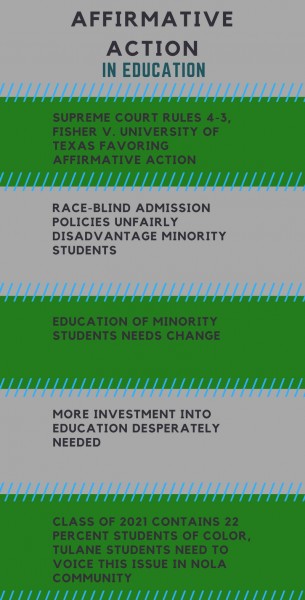Affirmative action critical for representation in universities

Catharine Fennell | Contributing Artist
With political conversations circling the collegiate admissions process, it is obligatory that Tulane students understand the ongoing debate over affirmative action. Supporters of a change in legislation claim white students are being denied admittance to universities in favor of less-qualified students of color.
One such supporter is Edward Blum, an activist for the Project on Fair Representation, who recruited University of Texas applicant Abigail Fisher as a poster child for the cause. Fisher, who is white, claimed the reason she had not been accepted to Texas was the color of her skin. The case ended in the U.S. Supreme Court with a 4-3 ruling, upholding Texas’ race-conscious admissions policy. The Court did state, however, that this ruling would not apply to all universities using such a policy. This raises an important question: how do universities maintain their diversity in spite of a color-blind admissions process?
Many claim white students would outperform their peers of color if colleges were to exclude race from consideration. In a recent article in the Washington Post, Rod Newhouse claims that, as the valedictorian of his majority black high school in Flint, Michigan, he was unprepared for the academic rigor he encountered at MIT. He claims this was the case with most of the students of color in college. What causes this disparity in performance?
The answer lies in the foundation of education for students of color. Historically, schools with higher minority populations have been underfunded and neglected. Even schools with small percentages of minority students receive less funding than schools that are entirely white. These cracks in the structure of their education leave students of color lagging behind their white classmates when the time comes to apply for college.
It is clear that the solution for this problem is to invest more, financially and otherwise, in the primary education of students of color across the country. Additionally, schools serving communities of color must provide comparable education and opportunities to their white counterparts, and education officials must be held accountable to improve the quality of education.
This need is particularly important in a state still reeling from the effects Bobby Jindal’s tenure as governor left on Louisiana’s public education system. His voucher program, for instance, took students who were previously disadvantaged and sent them to schools such as Light City Church School of the Prophets or a school with no actual teachers that relied on DVDs for instruction. The program still exists today, though Gov. Edwards has made cuts to the budget.
Students are suffering as a result of this disastrous experiment and many like it all over the country. Not only do these programs negatively affect the students who participate in them, they adversely affect the students who do not. They are programs funded by taxpayers and, therefore, pull from the same revenue stream as the public school system. When students use their vouchers to pay private school tuition, they siphon off funding public schools get each year.
Programs like these are gaining popularity under President Trump’s administration, the same administration pushing for affirmative action reform. While it is clear that changes to the program are on the horizon, it is more important to focus federal efforts on improving educational opportunities for students of color on the ground level. This is particularly important to Tulane, as the university makes strides towards diversifying the student body, with the Class of 2021 being 22 percent students of color. This class, along with its predecessors, has a responsibility to the New Orleans community to raise its voice as a representative of educational and social change. Let minority students know they are not alone: someone is rooting for their team.
This is an opinion article and does not reflect the views of The Tulane Hullabaloo. Jordan is a freshman at Newcomb-Tulane College. She can be reached at [email protected].
Your donation will support the student journalists of Tulane University. Your contribution will allow us to purchase equipment and cover our annual website hosting costs.



Leave a Comment